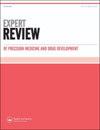达科替尼作为EGFR突变阳性非小细胞肺癌的一线治疗
IF 1.2
Q4 PHARMACOLOGY & PHARMACY
Expert Review of Precision Medicine and Drug Development
Pub Date : 2021-04-13
DOI:10.1080/23808993.2021.1909420
引用次数: 3
摘要
摘要简介:Dacomitinib是第二代表皮生长因子受体酪氨酸激酶抑制剂(EGFR TKI)。ARCHER 1050最近的结果显示,与吉非替尼相比,作为EGFR突变阳性晚期非小细胞肺癌(NSCLC)患者的一线治疗,dacomitinib可改善无进展生存期和总生存期。ARCHER 1050是第一个随机、开放标签、第二代与第一代EGFR TKI的3期试验。涵盖领域:我们回顾了达科替尼作为EGFR突变阳性NSCLC一线治疗的有效性和安全性,包括毒性管理,并评估了达科替尼对脑转移的活性。此外,考虑到EGFR TKI的选择、耐药机制、抗罕见突变的活性和实际剂量,本文还讨论了最佳治疗顺序。专家意见:EGFR TKIs的引入改变了EGFR突变阳性NSCLC患者的治疗策略。第二代和第三代EGFR TKIs是研究阐明第一代EGFR TKIs耐药机制的结果。对于EGFR突变阳性的晚期非小细胞肺癌患者,现在有不止一种治疗方案可以提高生存率,这突出了需要更清楚地了解在正确的时间对正确的人使用正确的药物,以及适当的治疗顺序如何为这些患者提供最佳的结果。本文章由计算机程序翻译,如有差异,请以英文原文为准。
Dacomitinib as first-line treatment for EGFR mutation-positive non-small cell lung cancer
ABSTRACT Introduction: Dacomitinib is a second-generation epidermal growth factor receptor tyrosine kinase inhibitor (EGFR TKI). Recent results from ARCHER 1050, the first randomized, open-label, Phase 3 trial of a second-generation vs. a first-generation EGFR TKI, showed that dacomitinib improves progression-free survival and overall survival compared with gefitinib as a first-line treatment in patients with EGFR mutation-positive advanced non-small cell lung cancer (NSCLC). Areas covered: We review the efficacy and safety of dacomitinib as a first-line treatment of EGFR mutation-positive NSCLC, including the management of toxicity, and evaluate the activity of dacomitinib against brain metastases. Additionally, the optimal treatment sequence given EGFR TKI choice, resistance mechanisms, activity against rare mutations, and real-world dosing is discussed. Expert opinion: The introduction of EGFR TKIs has changed the treatment strategy for patients with EGFR mutation-positive NSCLC. The second- and third-generation EGFR TKIs are the result of research elucidating mechanisms of resistance to first-generation EGFR TKIs. There is now more than one treatment option for patients with EGFR mutation-positive advanced NSCLC that improves survival, highlighting the need to more clearly understand the use of the right drug for the right person at the right time and how the appropriate treatment sequence may provide optimal outcomes for these patients.
求助全文
通过发布文献求助,成功后即可免费获取论文全文。
去求助
来源期刊

Expert Review of Precision Medicine and Drug Development
PHARMACOLOGY & PHARMACY-
CiteScore
2.30
自引率
0.00%
发文量
9
期刊介绍:
Expert Review of Precision Medicine and Drug Development publishes primarily review articles covering the development and clinical application of medicine to be used in a personalized therapy setting; in addition, the journal also publishes original research and commentary-style articles. In an era where medicine is recognizing that a one-size-fits-all approach is not always appropriate, it has become necessary to identify patients responsive to treatments and treat patient populations using a tailored approach. Areas covered include: Development and application of drugs targeted to specific genotypes and populations, as well as advanced diagnostic technologies and significant biomarkers that aid in this. Clinical trials and case studies within personalized therapy and drug development. Screening, prediction and prevention of disease, prediction of adverse events, treatment monitoring, effects of metabolomics and microbiomics on treatment. Secondary population research, genome-wide association studies, disease–gene association studies, personal genome technologies. Ethical and cost–benefit issues, the impact to healthcare and business infrastructure, and regulatory issues.
 求助内容:
求助内容: 应助结果提醒方式:
应助结果提醒方式:


